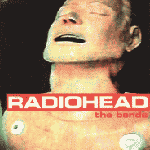
| Accueil | News | Concerts | Critiques | Intervious | Articles | Sources | E-Mail |
| Groupes: Radiohead | Discographie | The Bends | Critiques |
|
1993
Pablo Honey in no way was adequate preparation for its epic, sprawling follow-up, The Bends. Building from the sweeping, three-guitar attack that punctuated the best moments of Pablo Honey, Radiohead create a grand and forceful sound that nevertheless resonates with anguish and despair -- it's cerebral anthemic rock. Occasionally, the album displays its influences, whether it's U2, Pink Floyd, R.E.M. or the Pixies, but Radiohead turn clichés inside out, making each song sound bracingly fresh. Thom Yorke's tortured lyrics give the album a melancholy undercurrent, as does the surging, textured music. But what makes The Bends so remarkable is that it marries such ambitious, and often challenging, instrumental soundscapes to songs that are at their cores hauntingly melodic and accessible. It makes the record compelling upon first listen, but it reveals new details with each listen, and soon it becomes apparent that with The Bends, Radiohead have reinvented anthemic rock. Stephen Thomas Erlewine, All-Music Guide
Sophomore effort by U.K. alternative icons pushes the same modern rock buttons as their gold-certified debut, ``Pablo Honey,' with Thom Yorke's vocals shifting from caustic to mellifluous, and the band's music from acoustic balladry to hard-rock riffing or from industrial noise to Beatles-inspired pop. This alchemy of styles is most effective on first single ``Fake Plastic Trees,' ``High And Dry,' ``Just,' ``Black Star,' and ``Street Spirit (Fade Out).' All of these tracks are potential modern rock winners, capable of pushing ``The Bends' to dizzying heights. |
